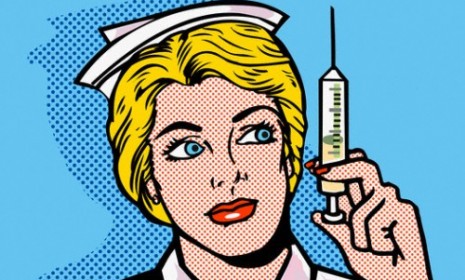Can a new vaccine end breast cancer?
Researchers at the Cleveland Clinic have developed a promising vaccine that attacks breast tumors. Time to break out the pink champagne?

A free daily email with the biggest news stories of the day – and the best features from TheWeek.com
You are now subscribed
Your newsletter sign-up was successful
Dr. Vincent Tuohy, an immunologist at Ohio's Cleveland Clinic, says breast cancer is "a completely preventable disease" that, like polio, can be virtually wiped out by his experimental vaccine. How does this vaccine, described in the journal Nature Medicine, prevent cancer, and is there a chance it could really spell an end to one of the leading causes of death in women? (Watch a Fox report about the breast cancer vaccine.)
Why are researchers optimistic about the vaccine?
The results in the test on lab mice were very promising. Tuohy and his colleagues used 12 mice genetically altered to be predisposed toward breast cancer; they injected six with the vaccine, which contains an antigen against a protein found only in breast tumors and lactating women, and six with a dummy vaccine. None of the mice with the antigen developed tumors, while all of the other mice did. The live vaccine also showed promise in shrinking existing tumors. "If it works in humans the way it works in mice, this will be monumental," Tuohy says. "We could eliminate breast cancer."
The Week
Escape your echo chamber. Get the facts behind the news, plus analysis from multiple perspectives.

Sign up for The Week's Free Newsletters
From our morning news briefing to a weekly Good News Newsletter, get the best of The Week delivered directly to your inbox.
From our morning news briefing to a weekly Good News Newsletter, get the best of The Week delivered directly to your inbox.
What's the bad news?
Just because the vaccine works in mice doesn't mean it will work in humans. Human trials could begin as early as next year, but even if the tests go well, it will probably be at least a decade before the breast-cancer vaccine is approved for the general public. Also, since the vaccine targets cells used in lactation, women who received the vaccine would be unable to breast-feed.
Who would get the vaccine?
Women 40 and over, and younger women at high risk of developing breast cancer.
A free daily email with the biggest news stories of the day – and the best features from TheWeek.com
Would this be the first cancer vaccine?
The FDA has approved vaccines to prevent cervical and liver cancers, by inoculating the body against certain viruses — but this would be the first vaccine to fight the cancer itself.
Why has no one done this before?
Cancer cells are hard to distinguish from healthy cells, so unlike a drug that targets a foreign matter like a virus, a poorly designed cancer-targeting drug could also ravage healthy tissue.
Could this technique be used for other types of cancer?
Tuohy says yes, if researchers can find other proteins that exist in tumors but not healthy tissues (except under certain avoidable conditions). Promising targets are bowel or prostate cancer. "Tumors are like drunks in a bar, saying and doing things they shouldn't," Tuohy explains, and if you can isolate the proteins that are acting up, you can fight cancer.
Sources: Daily Telegraph, HealthDay, BBC News, CBS News
-
 5 blacked out cartoons about the Epstein file redactions
5 blacked out cartoons about the Epstein file redactionsCartoons Artists take on hidden identities, a censored presidential seal, and more
-
 How Democrats are turning DOJ lemons into partisan lemonade
How Democrats are turning DOJ lemons into partisan lemonadeTODAY’S BIG QUESTION As the Trump administration continues to try — and fail — at indicting its political enemies, Democratic lawmakers have begun seizing the moment for themselves
-
 ICE’s new targets post-Minnesota retreat
ICE’s new targets post-Minnesota retreatIn the Spotlight Several cities are reportedly on ICE’s list for immigration crackdowns